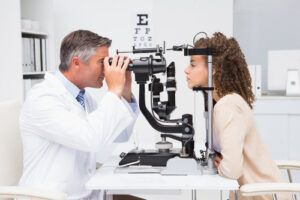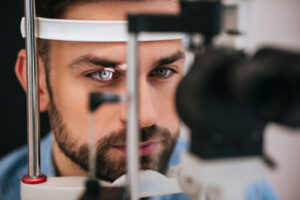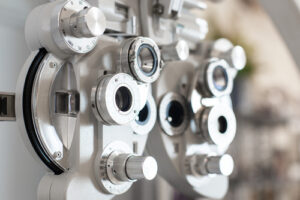Routine eye exams are essential for maintaining healthy eyes and detecting potential vision problems early on. At Prado Vision, we offer comprehensive eye examinations performed by experienced eye doctors, using state-of-the-art technology to ensure the best care for your eyes.
What is the Difference Between Optometry and Ophthalmology?

Optometry and ophthalmology are two professions within eye care.
Optometrists are primary eye health care professionals at the front line of eye and vision care. They examine, diagnose, treat, and manage disorders and diseases of the eye. In addition to providing eye and vision care with glasses and contact lenses, they play a role in an individual’s overall health by detecting systemic diseases and managing ocular effects of those diseases.
Ophthalmologists are medical doctors specializing in eye care and eye surgery. They can perform various eye surgeries, such as cataract removal and refractive procedures like LASIK. Additionally, ophthalmologists are skilled in treating complex eye diseases and conditions like glaucoma, macular degeneration, and diabetic retinopathy.
What Happens During a Routine Eye Exam?
A routine eye exam begins with some basic tests to assess your vision. You’ll be asked to read letters from an eye chart so your eye doctor can understand how clearly you can see.

They’ll also determine if you need glasses or contact lenses by using a device called a phoropter. Using this machine, your eye doctor will switch different lenses in front of you and ask which lens helps you see the best.
Next, they’ll check your eye muscles and coordination to ensure your eyes work together properly. A quick and painless eye pressure test follows to screen for glaucoma.
To get a better view of the back of your eyes, the doctor might use special eye drops to dilate your pupils. This allows them to examine your retina and optic nerve thoroughly.
Once all the tests are complete, the eye doctor will discuss the results with you. If you need glasses or contact lenses, they’ll provide you with a prescription, and you can choose frames and lenses.
Regular eye exams are essential for maintaining healthy eyes and clear, comfortable vision, so be sure to get them done even if you feel your eyes are fine, as it helps catch any potential issues early on.
Do I Need a Prescription to Get Glasses?
You typically need a prescription to get glasses. When you visit your eye doctor for an eye exam, they will assess your vision and determine if you have any refractive errors, like nearsightedness, farsightedness, or astigmatism.

If you do, they will write a prescription indicating the specific lenses you need to correct your vision. This prescription is personalized and tailored for your eyes, allowing the optical to create lenses that will improve your vision.
Whether you’re getting glasses for distance, reading, or both, the prescription ensures the lenses are designed for your eyes. If you’re considering getting glasses, the first step is to schedule an eye exam to get an updated prescription.
You are unable to use an expired prescription. This is to ensure that the glasses you receive accurately correct your vision.
Once you get an updated prescription, you can explore various frame styles and lens options to find the perfect fit for your eyes and personal style.
How Often Do I Need to Have a Routine Eye Exam?
Regular eye exams are crucial for maintaining optimal eye health and clear vision. It is generally recommended for most adults to have an eye exam every two years, even if they feel their eyes are in good condition.
However, those who wear glasses or contact lenses may benefit from annual exams to ensure their prescriptions are up-to-date and provide the best vision correction. For children, the first eye exam should take place around the age of three, and then, if no issues are detected, regular exams every one to two years are recommended.
As you age, your eyes become more susceptible to certain conditions, such as cataracts and glaucoma, so seniors, especially those over sixty, should schedule annual eye exams to monitor their eye health and catch any problems early on. In case of sudden changes in vision or other eye-related symptoms, you should not wait for your scheduled exam and instead promptly schedule a visit to an eye care professional.
Prioritizing regular eye exams ensures proactive eye care and can help identify and address potential issues before they become more significant problems.
How Long Does a Routine Eye Exam Typically Take?
A routine eye exam typically lasts between thirty minutes and an hour. The exact duration may vary based on various factors and the specific tests performed by the eye doctor.
These exams are essential for assessing your vision and overall eye health, ensuring any potential issues are detected and addressed early on. Regular check-ups play a crucial role in maintaining optimal eye health and preserving clear, comfortable vision.
It’s vital to make time for these exams to keep your eyes in excellent condition and catch any problems before they become more serious.
Is it time for you to have a routine eye exam? Schedule an appointment at Prado Vision Center in Tampa, FL today!


